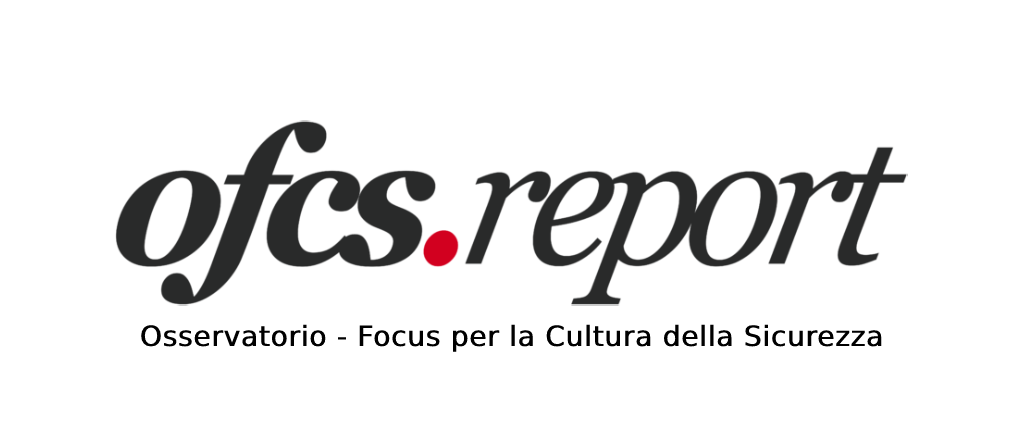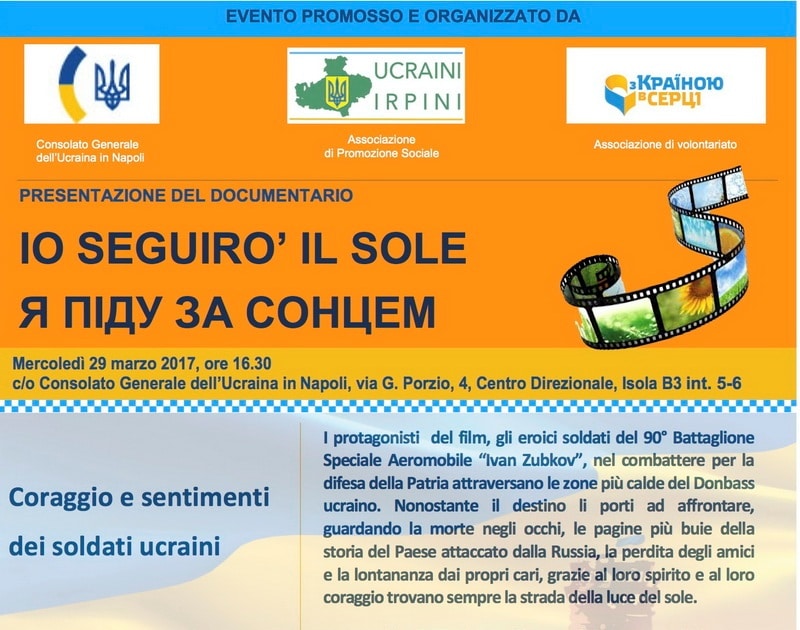“L’aggressione russa contro l’Ucraina non solo persiste, ma può anche intensificarsi vista la quantità delle truppe russe entrate in Ucraina e al confine. La Russia considera ancora l’Ucraina come una sua zona di influenza”. A raccontarlo a Ofcs.report è Stelmakh Ruslan, coordinatore dell’Associazione “Con il paese nel cuore” e produttore del film-documentario “Seguirò il sole”, intervistato a Bari durante la presentazione. Il film, avente come mecenate Yuri Makoviy, è dedicato ai combattimenti del battaglione aeromobile ucraino, denominato “Ivan Zubkov”, in nome dell’eroe di Ucraina, ucciso a gennaio del 2015 mentre difendeva l’aeroporto di Donetsk. Questo battaglione leggendario ha combattuto e vissuto i punti più caldi dell’Operazione antiterrorismo (ATO).
Mister Ruslan, partiamo proprio dal titolo della sua opera:“ Seguirò il sole”. Chi segue il sole? Sarebbe interessante contestualizzare gli eventi che hanno determinato il film documentario appena prodotto.
“La battaglia è avvenuta nell’ aeroporto di Donetsk e nei dintorni: la zona industriale, Zaytsevo e Avdeyevka. Durante gli scontri sono 45 i paracadutisti del battaglione morti. Molti di loro hanno sacrificato la vita per salvare i loro compagni. Hanno subito gli spari dell’artiglieria, come il tenente Ivan Zubkov, che è poi morto sotto le macerie dell’aeroporto. Un altro eroe dell’Ucraina Igor Branovitsky, ad esempio, in prigione identificato come mitragliere, si è reso vittima di un terrorista per salvare i suoi compagni dalle torture. Da queste drammatiche vicende è nato il progetto. Il regista e scenografo è Alexey Goncharuk. Questo è il suo terzo documentario su questa terribile guerra. Prima di questo aveva realizzato ‘L’aeroporto. Quel giorno’ e ‘Raid. La forza degli indomiti’. In realtà, Alexey è un giornalista sportivo e scrittore, attualmente sta terminando il libro sulla storia del Sambir in Ucraina (autodifesa senza armi)”.
Come nasce il titolo “Seguirò il sole” ?
“E’ il titolo di una canzone, lo ha scelto un volontario e psicologo, Tigran Grigoryan. Nel film la canzone si ascolta in due diverse occasioni, nella scena vicino al fuoco in lingua russa e in ucraino, e alla fine del video, nella didascalia. Il sole è la nostra stella principale, senza di essa non ci sarebbe vita sul pianeta. Inoltre, il sole sorge a est. Proprio lì, a est dell’Ucraina, ci sono i combattimenti. L’idea del film appartiene a un volontario, il responsabile dell’organizzazione dell’associazione “Con un paese nel cuore”, Yuri Makovìû. Lo stesso afferma: “..quando sono tornato a Kiev dopo la zona ATO, per la gente non c’era nessun problema, nessuna guerra, quasi fosse in secondo piano. C’è molta gente che ha questa illusione. Noi invece vediamo i soldati combattere a est, in situazioni importanti, e sappiamo tutte le imprese che i militari devono affrontare. Per questo motivo vogliamo ricordare, attraverso la nostra associazione, che la guerra permane alla porta accanto. I combattenti in prima linea, ogni giorno, rischiano la vita e hanno ancora bisogno di supporto. Non solo finanziario, ma anche morale”.
Lei coordina l’ Associazione “Con il paese nel cuore “. Di cosa vi occupate?
“Sosteniamo i sopravvissuti all’operazione ATO e le famiglie delle vittime”.
I media prestano poca attenzione alla crisi russo-ucraina. La stampa occidentale ne ha dato spazio durante la “Primavera Ucraina” nei primi mesi del 2014, quando “la rivoluzione” colpì l’opinione pubblica. Quali sono le evoluzioni attuali?
“La crisi non solo persiste, ma si è intensificata. La Russia considera ancora l’Ucraina come una sua zona d’influenza. Il vicino nord-oriente non accetta il fatto che l’Ucraina, in primo luogo è un altro stato, e in secondo sceglie i valori europei piuttosto che quelli russi”.
Quali sono le differenza culturali, religiose ed etniche tra i due popoli?
“La differenza culturale più importante è l’autonomia e la capacita di organizzare se stessi. Abbiamo un proverbio in Ucraina: “dove ci sono due ucraini, ci sono tre Ghet’man (il capo dei Kozaki ndr)”.
Alcuni media avrebbero accusato l’ultranazionalismo ucraino di svendere l’ interesse nazionale all’Occidente e di agire con una guerra intenzionale verso la Russia. Qual’ è la sua opinione a riguardo ?
“Come tanti paesi, anche noi abbiamo l’estrema destra, ma la sua percentuale è molto bassa, lo confermano le ultime elezioni parlamentari: i movimenti radicali hanno preso pochi voti. Il nostro desiderio di promuovere e sviluppare la cultura ucraina, in particolare la lingua Ucraina, per la Russia è percepito come nazionalismo. Mi dica, l’obbligo di conoscere la lingua del proprio Stato è un nazionalismo?”.
Ucraina significa letteralmente “che sta al confine”. Quale modello di nazione potrebbe sorgere nel futuro? La “Nuova Russia”, nata il 24 maggio 2014 e terminata il 20 maggio 2015, è stata frutto della volontà popolare o di Putin?
“Tutto ciò è il risultato delle azioni di Putin, ne ha parlato ripetutamente nelle sue interviste. Poi però Peskov ha ripiegato: è un fraintendimento. E’ noto il gruppo di Strelkov, il mercenario russo (Girkin) che, arrivato dalla Crimea in Slovyansk, ha occupato la città. Slovyansk è un importante punto sulla mappa, si trova nella periferia della regione di Donetsk , dove si incontrano tutte le strade che arrivano dalle altre regioni dell’est e portano verso ovest”.
*Per la traduzione dall’ucraino all’italiano ha collaborato Iuliia Ostapchuk.
The documentary film “I will Follow the sun ” is devoted to the Ukrainian aircraft and the struggle of the battalion in the name of the hero Ivan Zubkov, from its emerging to the its end , May 2016. This legendary unity has fought the warmest points of this war, that officially it is being called operation counterterrorism (ATO) or the military operation against the self – proclaimed popular republics of Donetsk and Lugansk, who declared independence after Ukraine ‘s coup in the Euromaldan movement which took place in the winter 2014. Its producer Stelmakh Ruslan, tells us why it was realized. He is the co-ordinator of the Ukrainian Association “With the country in the heart”, too.
Mr Ruslan: who does follow the sun? , could tell us about the documentary film you produced?
“The battle took place at Donetsk Airport and its surroundings, the industrial area, Zaytsevo area and Avdeyevka area. During this period, 45 paratroopers died. Many of them have sacrificed their lives to save their companions. Lieutenant Ivan Zubkov, died at the airport’s rubble. Another hero of Ukraine Igor Branovitsky, for example, in a prison identified as a machine gun ‘s man has become a victim of a terrorist to save his companions from torture. The director and set designer of the documentary film is Alexey Goncharuk. This is his third documentary about this terrible war. Before that, “The Airport, That Day,” “RAID, The Power of Indomitable.” In fact, Alexey is a sport journalist and writer, he is currently completing the book on Sambir’s story in Ukraine (self-defense without weapons) “.
Would you explain me the choice of such a title “ I will follow the Sun “ ?
“It s the title of a song given by a voluntary-psychologist Tigran Grigoryan. In the film, the song is twice sung, in the scene next to the fire in the Russian language and in the Ukrainian one, both at the end of the video and in the explanation. The sun is our principal star, without it there would be no life on the planet. Besides, the sun rises to east, right there to east of Ukraine the fights are taking place. The idea of the film belongs to a volunteer, responsible of the organization of the Association “With a country in the heart ” Yuri Makovìû. He assumes: “When I returned to Kiev after the zone ATO, people considered that there was any problem, any war. There are a lot of people having this illusion. We see those soldiers fighting to east, and their bad conditions”.
You are coordinator of the Association “ With our country in our hearts “. Would you tell me more about this Association?
“The Association is helping the ATO members , survivors, and the victims ‘ s families”.
Mr Ruslan, medias are paying little attention to the Russian-Ukrainian crisis. The western press has given space to it during the ” Spring Ukraine” in the first months of 2014, when “the revolution” in the area struck the public opinion. Which are the actual evolutions in the area, does the crisis remain?
“The crisis is not only persisting, but intensified, too. Russia still considers Ukraine as an area of its influence. The near north-east doesn’t accept the fact that Ukraine, in first place, is another state and in according to, it chooses the European values, rather than those Russians ones”.
Some medias accused the Ukrainian ultra nationalism to undersell the national interest to the West, and to act with a deliberate war towards Russia. What is your opinion about? .
“Like many countries, we have the extreme right, as well. Its percentage is very low, it is confirmed from the last parliamentary elections, where the radical movements have taken a few votes. Our desire is to promote and to develop the Ukrainian culture – particularly the Ukraine language. It is perceived as nationalism, from Russia. Apparently, the obligation to speak and know the language of “your country” is perceived as nationalism”.
Ukraine literally means “ what is at the border “, which model of nation are you foreseeing in the future? The “New Russia” born on May 24th 2014 and finished on May 20th 2015, does derived from the popular wish or Putin’ s one?
“All of this is the result of Putin’ s action, he has repeatedly spoken about it in his interviews. Peskov has refolded, though: it is a misunderstanding or other similar things. We all Know the group of Strelkov a Russian (Girkin) mercenary, arrived from Crimea in Slovyansk, occupying the city. Slovyansk is an important point on the map, it is found in the outskirts of the region of Donetsk, where all the roads meet, those arriving from the other regions of east towards west”.








